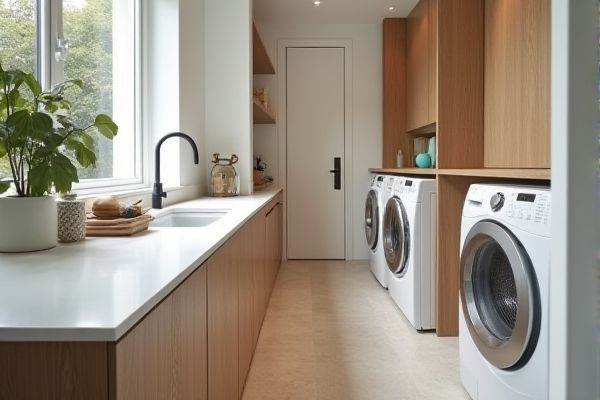
Floating countertops in laundry rooms offer a sleek, modern look with easy cleaning access underneath, while fixed counters provide sturdy, permanent workspaces with increased storage options below. Discover which countertop type best suits Your laundry needs by exploring the full article.
Table of Comparison
| Feature | Floating Countertop | Fixed Counter |
|---|---|---|
| Installation | Wall-mounted, no floor support | Secured to walls and floor with cabinets |
| Space Utilization | Maximizes floor space, open below | Includes cabinets for storage underneath |
| Storage | Limited or no built-in storage | Ample storage with base cabinets |
| Cleaning | Easier floor cleaning due to open space | Requires cleaning around and under cabinets |
| Weight Capacity | Moderate; depends on wall support | High; supported by cabinets and floor |
| Design Flexibility | Modern, minimalist aesthetic | Traditional to custom cabinetry styles |
| Cost | Generally lower installation cost | Higher cost due to cabinetry and labor |
| Maintenance | Easy access for repairs behind countertop | Can be harder to access plumbing behind cabinets |
Introduction to Floating and Fixed Countertops in Laundry Rooms
Floating countertops in laundry rooms offer a minimalist design by being mounted directly onto walls without visible support, maximizing under-counter storage and floor space. Fixed countertops, anchored on cabinets or frames, provide sturdy surfaces ideal for heavy-duty tasks and often include integrated storage units. Choosing between floating and fixed countertops depends on space availability, design preferences, and functional requirements in laundry room setups.
Design Differences: Floating vs Fixed Countertops
Floating countertops in laundry rooms offer a sleek, modern design by being mounted directly to the wall without visible supports, creating an open, airy feel and making floor cleaning easier. Fixed countertops are anchored to cabinetry or built-in structures, providing more robust weight support and additional storage options underneath, ideal for heavy-duty laundry tasks. Your choice between floating and fixed countertops depends on whether you prioritize minimalist aesthetics or maximum functionality in your laundry space.
Space Efficiency and Storage Options
Floating countertops in laundry rooms maximize space efficiency by freeing up floor area beneath, allowing for flexible storage solutions like open shelves or pull-out baskets. Fixed counters provide robust, continuous surface areas with built-in cabinetry underneath, offering ample enclosed storage ideal for organizing detergents and cleaning supplies. Your choice depends on whether you prioritize open, airy designs or comprehensive storage capacity for a tidy laundry space.
Installation Process and Complexity
Floating countertops in laundry rooms involve a more complex installation process, requiring precise wall anchoring and stud reinforcement to ensure stability without base cabinets. Fixed counters are simpler to install, typically mounted on cabinets or brackets with straightforward fastening techniques. The choice impacts installation time and skill level, with floating setups demanding more expertise for safe and secure attachment.
Durability and Load-Bearing Capacity
Floating countertops in laundry rooms offer moderate durability but generally support less weight compared to fixed counters, as they rely on wall-mounted brackets for stability. Fixed countertops, anchored with cabinets or solid supports, excel in load-bearing capacity and withstand heavy appliances or substantial folding tasks without risk of sagging or damage. For high durability and maximum load support, fixed counters provide a more reliable solution in laundry room design.
Maintenance and Cleaning Considerations
Floating countertops in laundry areas offer easier access for cleaning underneath and around the surface, reducing the accumulation of dust and debris compared to fixed counters. Fixed counters often have seams and crevices where dirt and moisture can collect, requiring more detailed maintenance to prevent mold and mildew buildup. Your choice impacts long-term upkeep, as floating countertops generally simplify routine cleaning and maintenance tasks.
Cost Comparison: Floating vs Fixed Countertops
Floating countertops typically cost more than fixed countertops due to specialized mounting hardware and installation complexity, with prices ranging from $200 to $600 per linear foot. Fixed countertops, often supported by cabinetry or brackets, generally range from $150 to $400 per linear foot, making them a more budget-friendly option for laundry rooms. Installation costs for floating countertops can also be higher because of the required wall reinforcement to support the weight.
Aesthetic Appeal and Style Versatility
Floating countertops in laundry rooms create a sleek, modern aesthetic by visually opening up space and enhancing light flow, appealing to minimalist and contemporary design enthusiasts. Fixed counters offer style versatility through customization options like cabinetry integration, material choices, and finishes that can complement traditional or eclectic decor. Both options enable functional organization while allowing homeowners to tailor the space's look according to personal taste and architectural style.
Best Applications for Each Countertop Type
Floating countertops are ideal for laundry rooms with limited space or where a modern, minimalist design is desired, allowing easier cleaning and flexibility in accessing plumbing. Fixed countertops provide sturdy, permanent surfaces perfect for heavy-duty tasks and long-term setups, offering maximum durability and integrated storage options. Choosing between the two depends on your laundry room size, design preference, and functional needs for daily chores.
Choosing the Right Countertop for Your Laundry Room
Floating countertops in laundry rooms offer flexibility and easy access to plumbing, making cleaning and maintenance simpler, while fixed counters provide robust stability for heavy-duty tasks and additional storage options underneath. Your choice depends on the balance between aesthetic appeal, space utilization, and the functional demands of your laundry activities. Opt for floating countertops if you prioritize modern design and accessibility, but choose fixed counters for durability and maximizing organized storage solutions.
 homyna.com
homyna.com